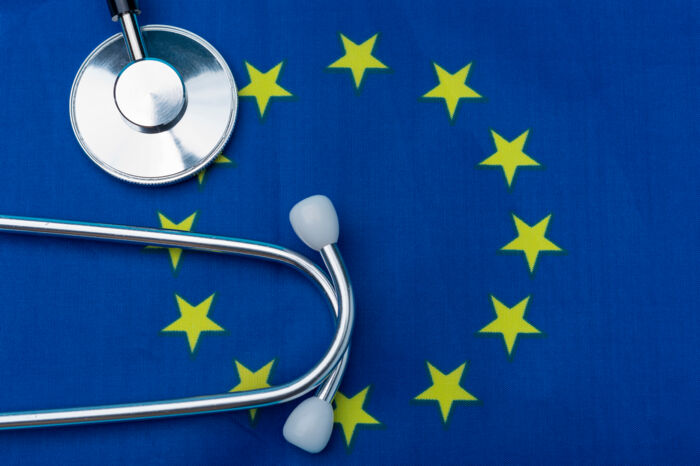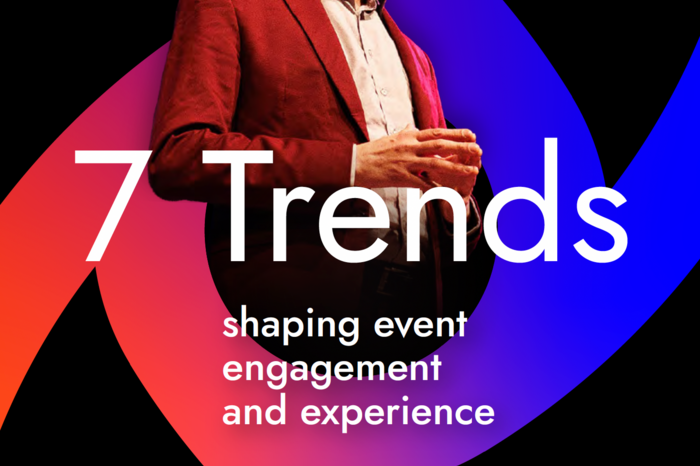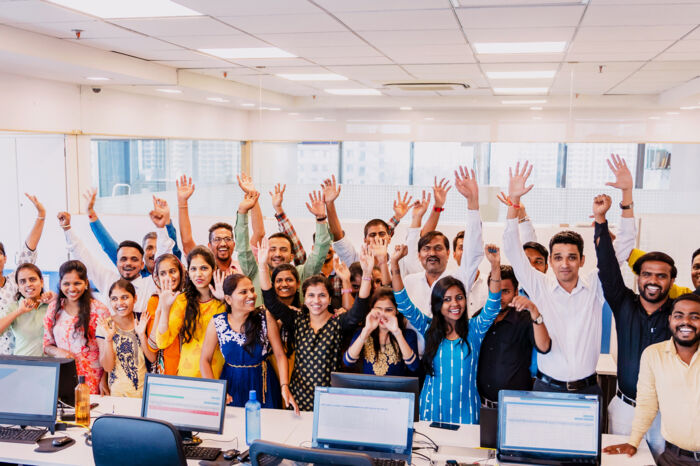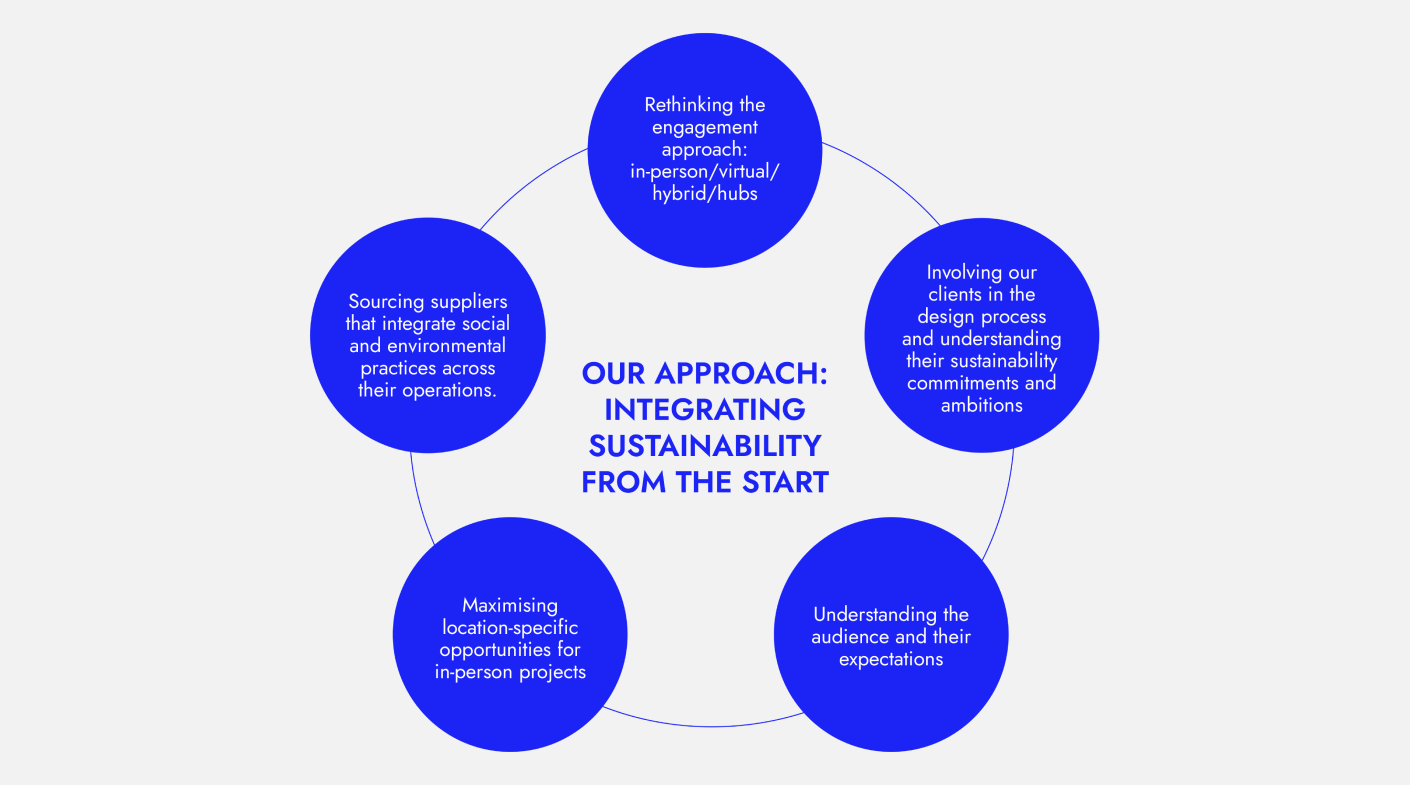
Our responsible experience model
Whilst every project is different, and there is no “one fits all” approach, we have developed
a practical 5-part model to ensure sustainable environmental impact, positive social impact and diversity and inclusion are a central part of how our projects are organised.
In addition to these five areas, we also conduct regular materiality assessments – meaning we’re not only integrating what we think is right, but also what is most important to our clients.
Creating responsible experiences
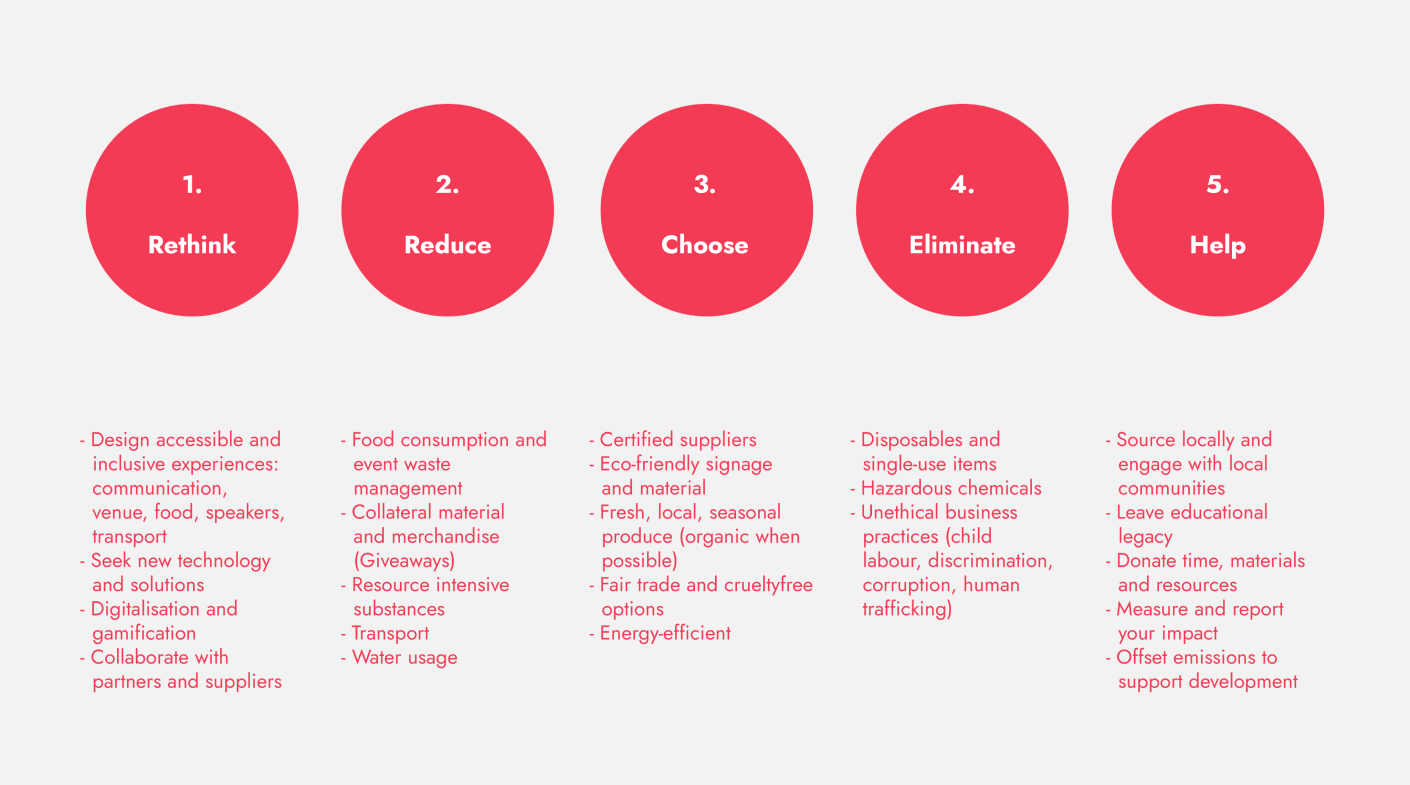
On the environmental front, we are currently launching a new solution to help our clients measure the impact of their projects and reduce the environmental impact at live, hybrid or digital events.
The goal is to measure where the highest emissions sources lie, and work together to reduce them and provide options to offset what can’t be reduced. We are launching and rolling out 2 new tools in 2023 to help us do just that.
Ultimately, we aim for 100% of our client proposals to include an environmental / carbon tracking approach and a social approach by 2024.
Empowering our teams
We strive to ensure our teams are ready to hit the ground running when it comes to building sustainability into all that they do.
In 2022, we launched our Sustainable Events Guidelines to support this goal. This detailed document provides a comprehensive set of best practices for designing and executing sustainable client projects.
We have also developed specific guidelines and training focused on diversity and inclusion to assist our teams in creating inclusive experiences.
Last year, we delivered 80 client projects that focused on sustainability or that incorporated sustainable practices, including three Net Zero events.
A holistic approach to integrating sustainability: our sustainability strategy for associations
Associations are uniquely positioned to directly impact sustainability through their own operations and business practices, whilst also amplifying the positive impact of their members.
Through core programmes, initiatives, and product development, associations can empower individuals and organisations worldwide to follow their guiding principles and codes of conduct and affect meaningful, long-term sustainability.
Here’s how our association sustainability strategy works:
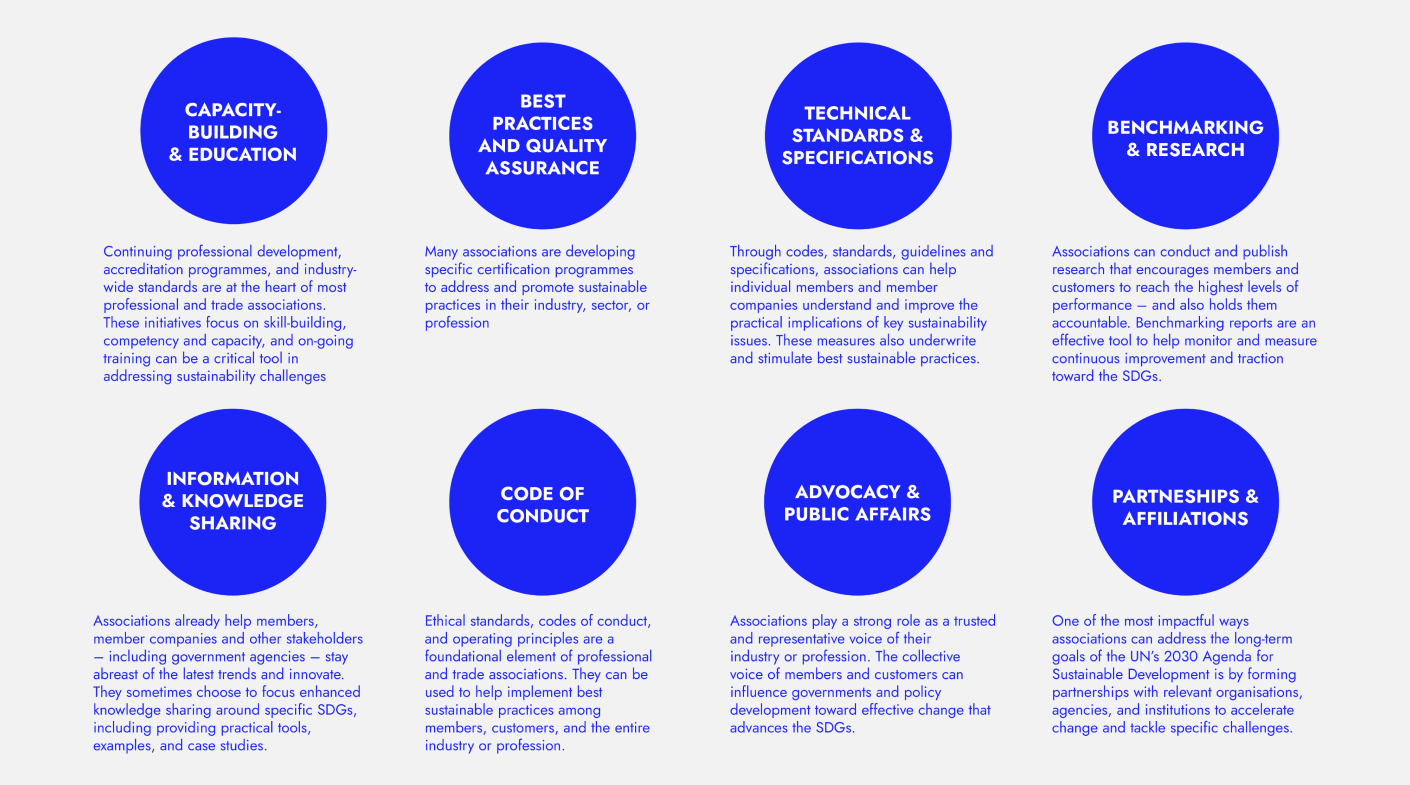
Creative technology
With Dorier, our audiovisual experience designers, we continuously seek new solutions to help our clients engage and activate their audiences while reducing the carbon and waste footprint during events.
A brand new world
NFTs (non-fungible tokens) appeared in 2017. They are tamper-proof decentralised digital certificates which have gained fame because of their appropriation by the art world. Although these new technologies are currently in the media spotlight, they represent only one brick of a much larger technological movement, crystallised under the marketing term “Web3”, which includes a monetary system (Bitcoin), an economic system (DeFI), a property system (NFT), a governance system (DAO), and an identity system (DID) all at once. This technological revolution invites us to rethink the entire digital strategies and business models of the future, including de facto the event industry, which has henceforth become experiential and memorial.
Gaming
This web3 environment opens the way to new neo-media experiences and creations by developing around a booming sector: video games. This sector, which today represents more than twice the economic weight of music and cinema combined, is seizing on virtual concerts that can, as in 2020 with Travis Scott’s concert, bring together up to 12.3 million spectators in a single location.
Multi-site events
Multi-site events are the most efficient way to connect multiple cities and make a dispersed audience feel they’re living the same experience simultaneously. By strategically selecting the locations of event hubs, we can offer alternative destinations which drastically reduce carbon emissions and considerably shorten travel time for event participants.
Humagrams
If you are looking to wow an audience, Humagrams (speaker holograms) are a great option. Capable of “beaming in” anywhere in the world for two-way interactions with the audience, they can be pre-recorded or filmed live from another location. In addition to offering innovative and engaging opening, closing and educational sessions, they transcend time and geography, decreasing carbon emissions by avoiding long-haul flights and scheduling conflicts.
Digital marketing with kabloom
Kabloom: Exceeding a global climate change virtual conference’s registration target by 145%
After a successful 2021 campaign for a leading global financial organisation, we were asked to continue work for their 2022 conference on climate change. In.2021, the organisation was affected by the global COVID-19 pandemic and needed help driving registrations, so we used our extensive research, data insights and GDPR-compliant databases to help them create the first-ever virtual edition of the event.
We provided a digital advertising campaign, ad design, and website/landing page content consultation and guidance. This enabled us to attract more attendees than ever before, meaning we were able to exceed our registration targets by 145%.
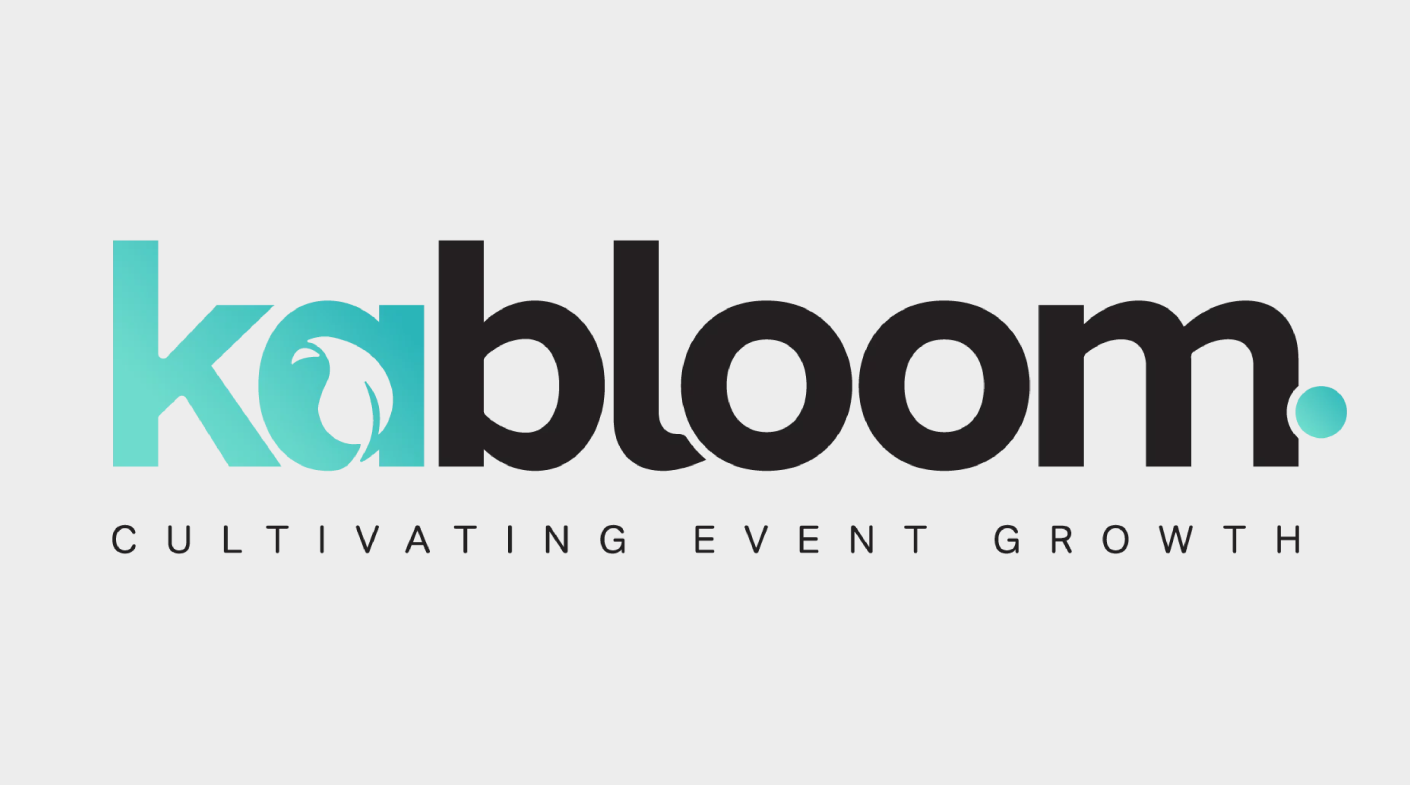
Client satisfaction measurement programme
Our client satisfaction measurement programme not only helps us ensure quality, it also enables us to evaluate the success of our sustainability programmes in the eyes of our clients.
By regularly analysing performance and making the required organisational and procedural changes, we can ensure that we remain aligned with our clients’ expectations and sustainability strategies.
2022 client satisfaction results
Our client satisfaction measurement programme not only helps us ensure quality, it also enables us to evaluate the success.
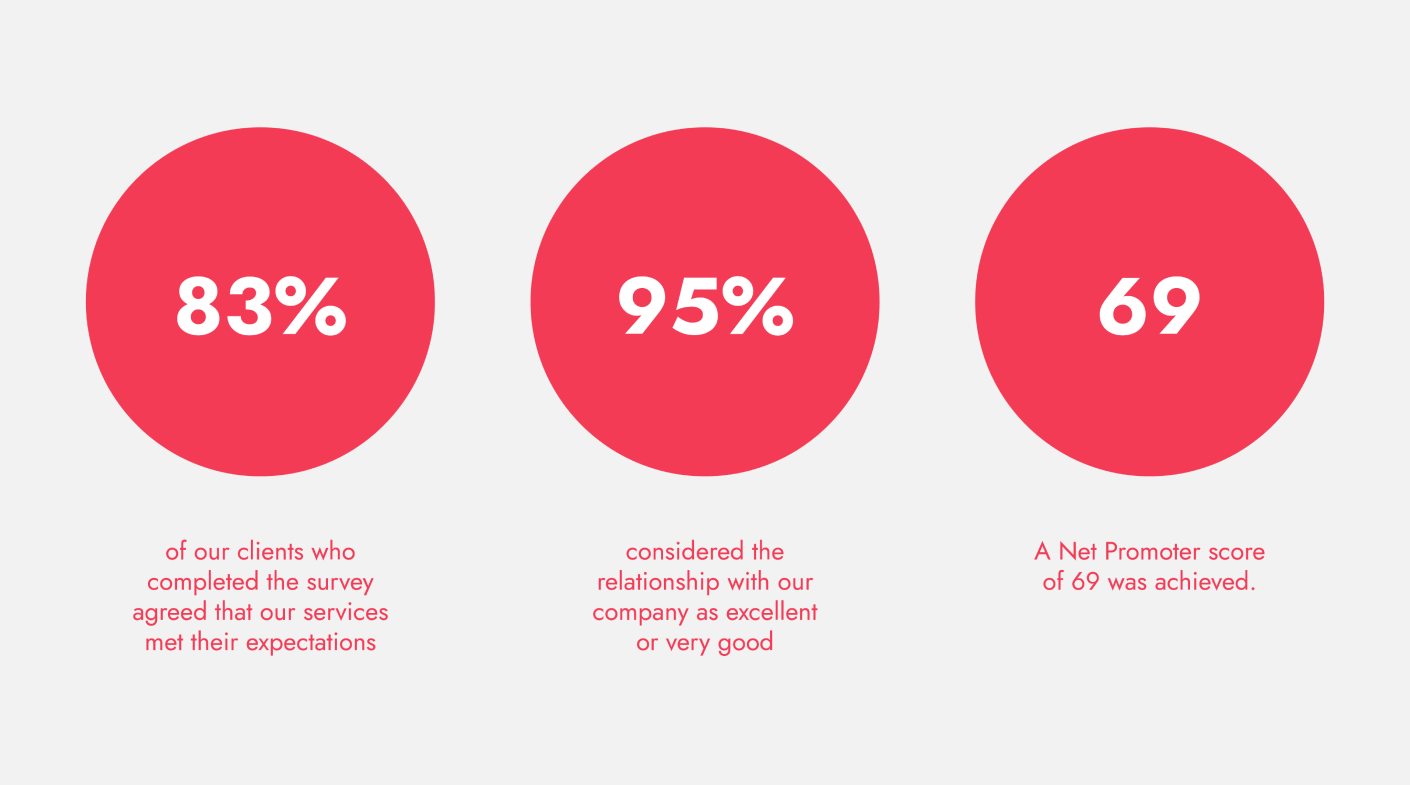
Engaging with the industry to drive positive change
With a 35+ year proven track record and an agency network that spans the globe, we strive to extend our influence beyond the field of sustainable events and act as a mouthpiece and platform for the sustainability industry itself.
In line with SDG #17 “Partnership for the Goals”, we have taken an active role in encouraging clients, partners, suppliers, competitors and governments to adopt a higher standard of sustainable business practices within the industry.
Here are some of our initiatives:
- Our agency MCI has signed the Net Zero Carbon Events Pledge,an industry initiative to address climate change, and sits on the board committee and in the task force to help construct an industry-wide roadmap towards net zero by 2050
- mci group, with leading event industry organisations IMEX, European Cities Marketing ICCA and ICCA’s Scandinavian Chapter, launched the Global Destination Sustainability Movement. This collaborative platform promotes the sustainable growth of international meetings and events destinations, highlighting best practices and responsible business tourism
- Since 2007, mci group leaders have delivered hundreds of keynote sessions and workshops on sustainability, inspiring change and better business practices, reaching more than 39,400 people in the events industry
- mci group experts are involved in developing learning resources, standards and/or sustainability initiatives in the events industry, such as the events industry sustainability principles (by the Events Industry Council), of which mci group is a launching signatory
- Finally, mci group representatives occupy prominent positions within event industry associations or local convention bureau sustainability task forces, enabling us to share our sustainability vision and knowledge, and collaborate with a broad audience.
Key global associations we belong to include:
- ABPCO (Association of British Professional Conference Organisers)
- The AMC Institute
- AGES (Association of Global Event Suppliers)
- ASAE (The Center for Association Leadership)
- AV Alliance
- CRN (Congress Rental Network)
- ESAE (European Society of Association Executives)
- FICP (Financial & Insurance Conference Planners)
- GSTC (Global Sustainable Tourism Council)
- GMIC (Green Meeting Industry Council)
- IAPCO (International Association of Professional Congress Organisers)
- ICCA (International Congress and Convention Association)
- INCON
- ISITE (International SITE Foundation)
- JMIC (Joint Meetings Industry Council)
- MPI (Meeting Professionals International)
- PCMA (Professional Conference Management Association)
- SAMA (Strategic Account Management Association) •SITE (Society of International Travel Executives)
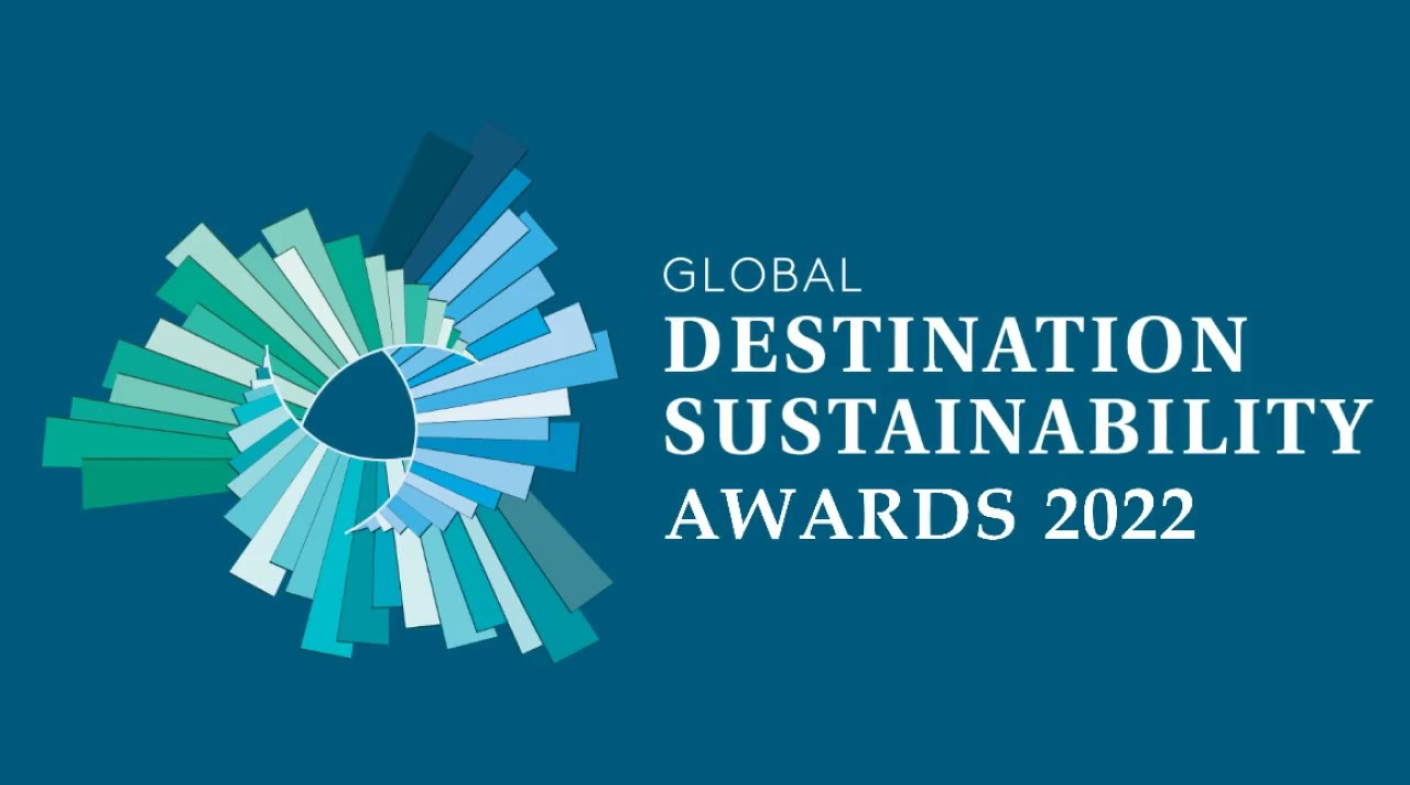
Supply chain management and procurement
Supply often lies at the foundation of successful audience engagement. However, when organisations are looking to procure the right materials, it is vital that they do so with far-reaching care and due diligence to protect the planet and its most vulnerable communities.
At a strategic level, our supply chain is managed by our global procurement teams, who work hand in hand with our group sustainability team. Each agency has a procurement responsibility in line with our Code of business conduct, which helps to keep our operations as sustainable as possible at the supply level.
Our supplier code of conduct outlines our minimum expectations in terms of labour practices (such as discrimination, decent work and health and safety), human rights (including child or forced labour), ethical matters (anti-bribery and corruption) as well as environmental commitments.
We expect all our partners, suppliers and subcontractors to adhere to and support this code, which is why it is an integral part of our vendors agreement, and all our suppliers must sign.
Scale of supply chain
In 2022, we spent €+300 million on third-party suppliers to manage client operations. This does not factor in the indirect spend on behalf of our clients, wherein we were acting as an agent.
Pre-Covid-19, our largest category of procurement was hotels, which accounted for more than half of our total spend. Venues, food, audio-visual, transport, temporary staffing, décor and destination management services made up the rest.
In 2022, with the shift to a more digital experience, our largest spending categories were for audio-visual and production services and digital solutions and platforms.
Supplier engagementSuppliers are increasingly committed to environmental and social best practices which, in turn, helps us to deliver more sustainable projects.
However, there’s always more to be done. To ensure that the supply process is constantly being refined, we continuously engage with our suppliers and partners to define how we can accelerate improvements across the value chain together.
Assessing performance
An initial assessment of our suppliers is done through our internal event audit tool. Further evaluations of supplier compliance against our code of conduct are then conducted on both random and specific bases.
Our local and group procurement teams are also provided the tools to evaluate performance independently. For high-profile events, our group sustainability team may be involved to assess and audit performance.We have identified supplier assessment as an area where we need to improve and create more rigorous procurement processes. An audit task force, consisting of our group data protection, risk & compliance officer, our global procurement manager, our group sustainability team and one member of our executive team, will work on an audit approach that will cover: risk and financial analysis, data protection, information security system, ethics and social and environmental criteria.
Stories on responsible consumption & production
ESCRS sustainable event
The ESCRS (European Society of Cataract & Refractive Surgeons) promotes education and research in the field of implant and refractive surgery and ophthalmology. MCI Switzerland (PCO) together with MCI UK (AM&C) and Kabloom (for the digital marketing aspects) organised their 40th Annual Congress last September in Italy gathering over 13,000 delegates. Setting the vision for a better future, sustainability was an essential part of the congress.
The strategy: A sustainability team was formed with the congress’ stakeholders to co-create a strategy and implement a bold operational action plan called “Mission Zero”. Aligned with the UN Sustainable Development Goals and with 4 main goals, here is the strategy that was defined.
Key achievements: By embarking all stakeholders in their approach (participants, exhibitors, sponsors, organisers and suppliers), they were able to implement a number of impactful initiatives:
Communications & Engagement: Developed a sustainability communications campaign to engage, inspire and educate delegates: website, emails, social media; Onsite: Sustainability Wall about sustainable practices at the congress and beyond; Exhibitors’ engagement: exhibitors guide and Sustainable Exhibitor Award won by Johnson and Johnson Vision.
Material: Badges, pins and lanyards recycled for future events; ESCRS reusable water bottles and water stations connected to the drinking water system at the venue; Advanced recycling system of paper, glass, plastic & cans, compost and food waste.
Food & Beverages: No red meat served on the entire congress; 60% locally and regionally sourced ingredients; Healthy, climate-friendly, vegetarian and vegan options; 90% compostable packaging
Carbon emissions: The congress’ carbon emissions were measured using the TRACE tool. After reducing the congress’ emissions as much as possible, 12,000 tons of unavoidable emissions have been offset through Climate Impact Partners and three projects that:
Provide clean and safe cooking and water systems to isolated communities
Increase well-being and eye health by reducing smoke inhalation and air pollution
Provide renewable energy solutions that protect the local environment and offer communities affordable and reliable energy access.
In addition, 6,723 participants have offset their travel.
2022 International Cooperation Forum
The Swiss Confederation organised the first International Cooperation (IC) Forum on climate change in Geneva from 31 March to 1 April 2022.
The IC Forum gathered experts from the fields of academia, business, politics and civil society to find ways out of the climate crisis. MCI Switzerland worked hand in hand with Dorier and logos teams on this event, hosted by the President of the Swiss Confederation, Ignazio Cassis.
The Swiss Federation was committed to integrating sustainability into the entire life-cycle of the online and offline event design and execution. Our teams partnered with the Global Destination Sustainability Movement and key suppliers to develop a sustainability strategy for the event and measure, report and compensate for the carbon footprint of the Forum, to make it CO2-neutral.
The teams worked with all suppliers and subcontractors right from the signing of the contract, advising and monitoring them to guarantee a CO2 optimised service or delivery of goods. The unavoidable emissions are compensated by the Resource and Environmental Management of the Federal Administration (RUMBA).
The following common opportunities and focus areas were identified:
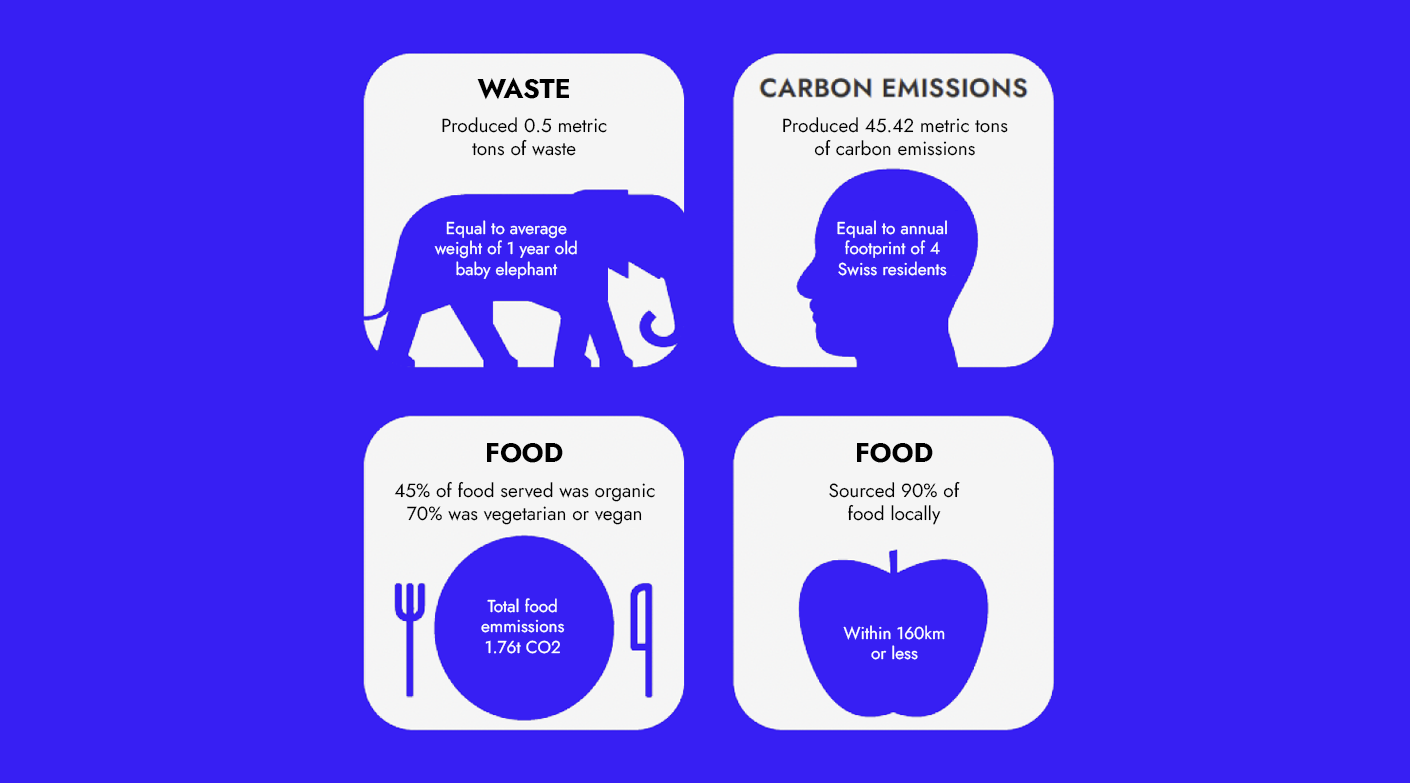
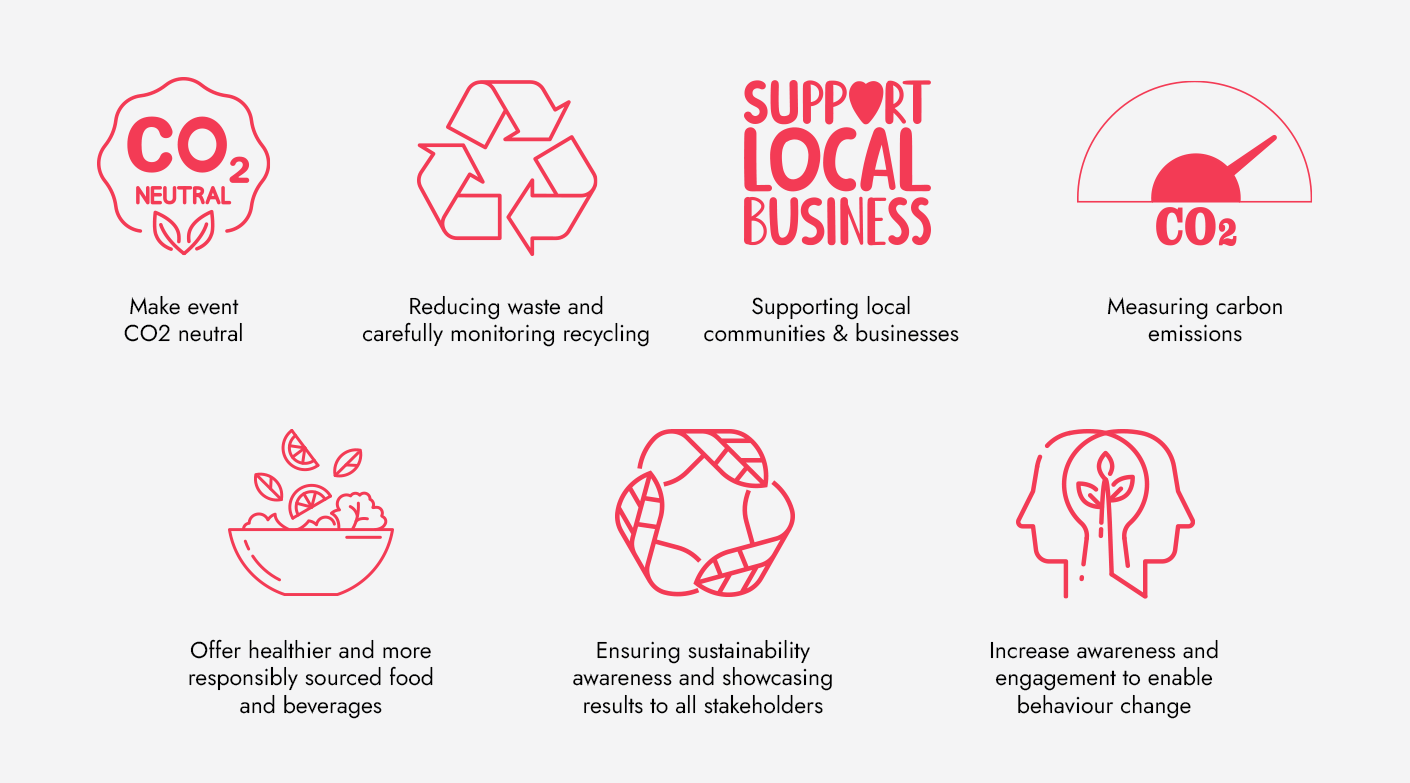
A Forum for Global Challenge
On behalf of the University of Birmingham, our teams created a public-facing campaign for the Forum for Global Challenges, an inaugural event that brings together thought leaders in sustainability and equality, along with other academics, policymakers, NGOs, students and corporate leaders.
The campaign celebrated the connection between those taking part in the Forum and those around the world who need solutions. It adopted a dynamic and emotive tone of voice with calls to action, like the strapline “I deliver every day, now it’s your turn”.
Our teams also created a dedicated campaign for the Youth Programme, specifically targeting the forum’s target audience of people aged 18-25. This campaign was promoted on the University of Birmingham TikTok channel and as part of the Forum on all social media channels.
The event was a collaborative mci group effort, with MCI UK coming up with the creative ideas to promote the event, the narrative and designs of the campaign, which built lasting brand recognition, and Kabloom using their expertise to promote and maximise it across all digital channels.
- The digital marketing efforts contributed to 30% of total registrations and generated more than 60% of overall website traffic.
- 4,812,432 impressions
- 33,782 clicks
- 2,149 followers gained over the 5-month campaign
- 39,772 unique visitors
- 94,375 page views
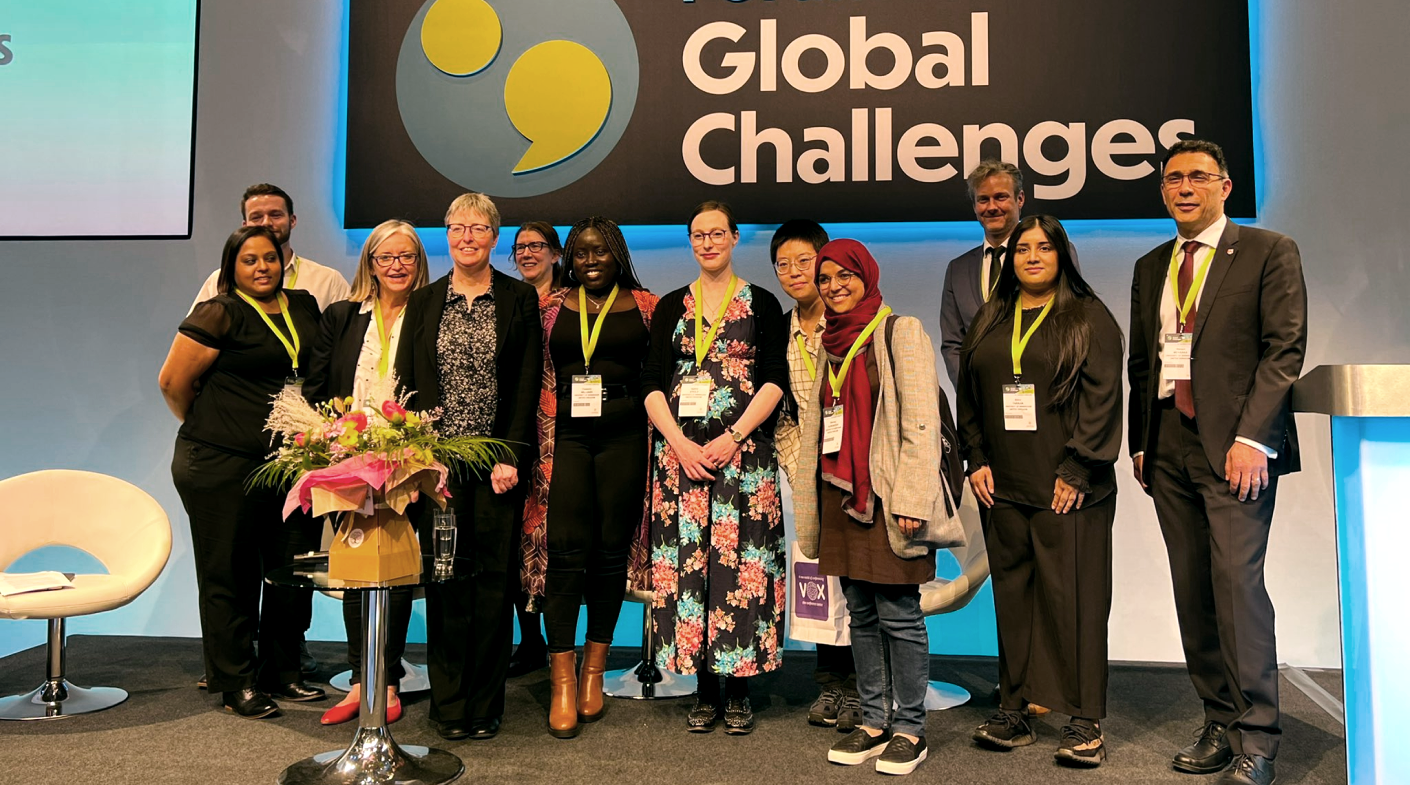
MCI The Netherlands team helped plan the official opening of the Energy Transition Campus Amsterdam with Shell
The Energy Transition Campus Amsterdam (ETCA) Opening Event celebrated the transformation of the Shell Technology Centre Amsterdam (STCA) into an open innovation campus, where researchers, engineers and entrepreneurs are welcomed to tackle the world’s challenge for a cleaner energy future.
The team transformed the campus’ atrium into a professional-looking studio, and the garden into an entertaining festival area. Health, Safety, Security and Environment (HSSE) and therefore, sustainability were embedded and showcased throughout all the organisational elements of the event.
Some of the key sustainability practices and achievements our teams implemented include:
- Worked exclusively with local suppliers only and businesses
- Suppliers followed the HSSE rules and regulations
- Encouraged the use of public transportation as much as possible
- Booth, stage and technical set up used reusable materials only
- Zero waste of materials
- Used inhouse digital signage only
- Used local ingredients only and menus made mainly of vegetarian products
- Reduced waste by ordering and serving food in the right quantities (based on registrations)
- Badges & lanyards produced with sustainable materials only and lanyards were reused on the campus after the event
- Digital communications only
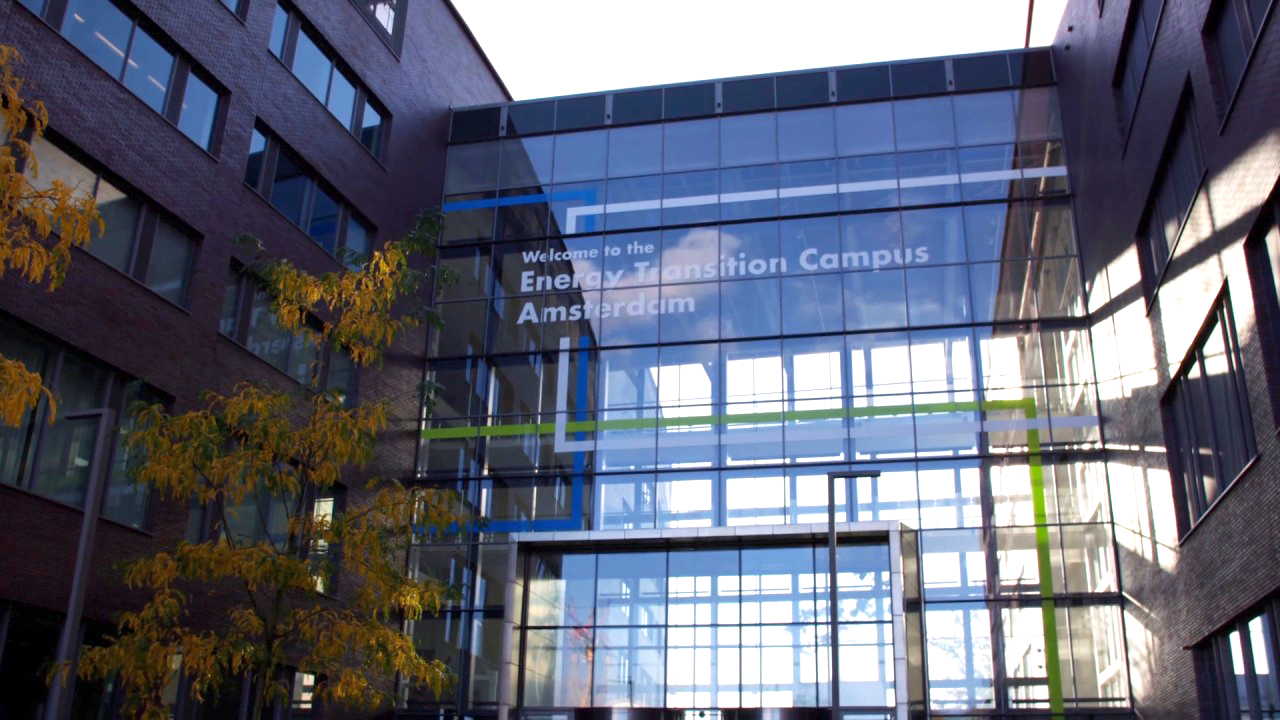
MCI & Dorier Switzerland create climate neutral event
MCI & Dorier Switzerland team guided a commodity trading company and long-term client in making their 20th-anniversary event carbon neutral for the first time.
After reducing the environmental impact of the event where possible, the team worked in collaboration with our HQ Sustainability Team and MyClimate to measure and report the carbon emissions created by the +600 guests, the venue, F&B, transports and material.
As a result, they decided to offset the 3308 tCO2 to fund the project Efficient Cook Stoves for Returnees in Burundi. The stoves are handed out in reception camps in Burundi by aid organisations. They have improved combustion, resulting in reduced household air pollution and its associated adverse health effects.
This first experience sparked further discussions with our client about creating a sustainability strategy for their future events. We will work with them to define a long-term sustainable approach to improve the emissions of their annual events with clear reduction targets before offsetting what is left.
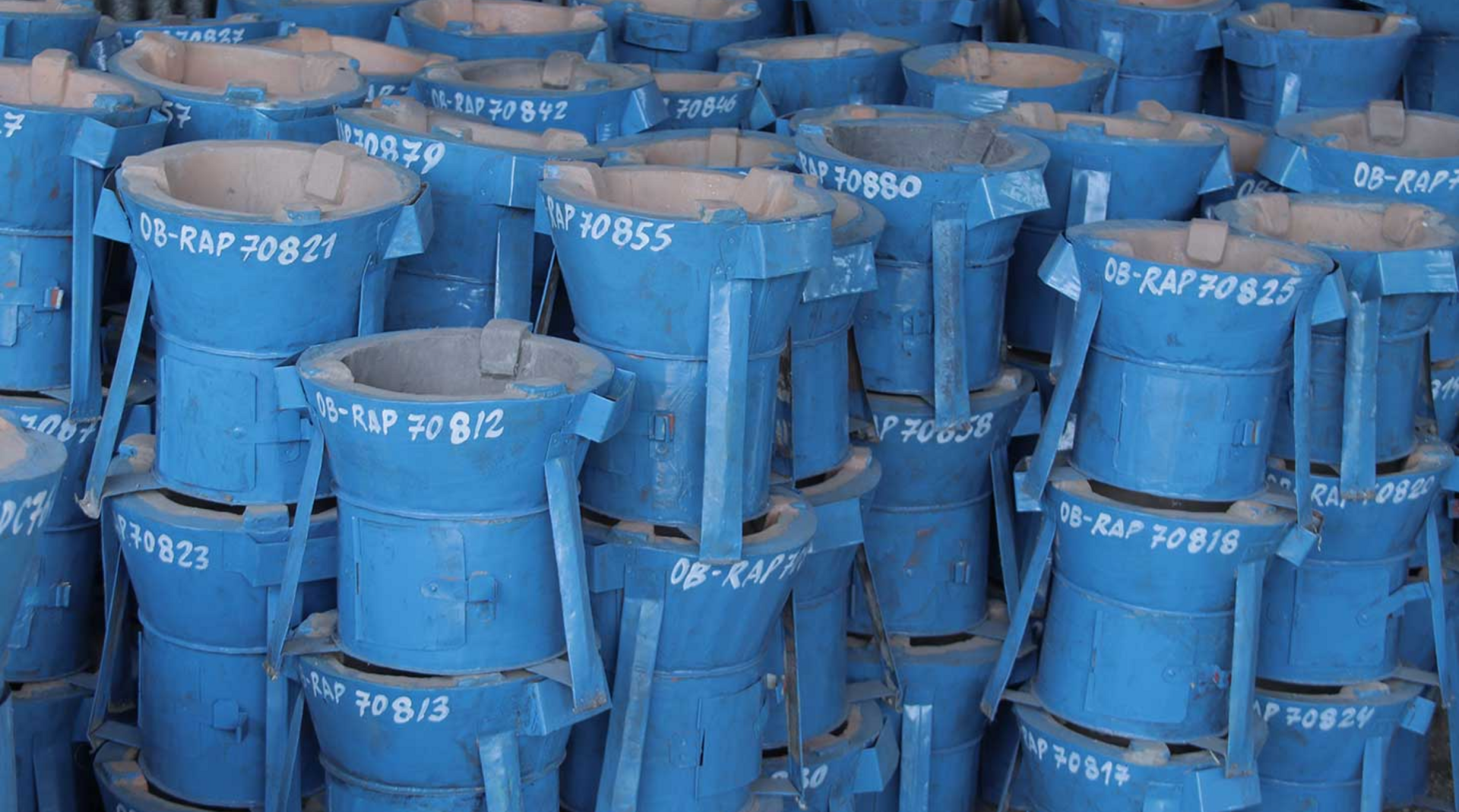
First Global Challenge 2022
Empowering the next generation to tackle the challenges we face as a global society.
In October, MCI Switzerland PCO, Meetings & Events and Dorier teams worked hand-in-hand on the FIRST Global Challenge 2022. This Olympics-style, international robotics competition sees each nation send a team of young people to build a robot and compete around one of the greatest challenges facing our planet.
For this year’s edition, the theme was “Carbon Capture.” It challenged 186 teams to capture and store carbon using robots. This challenge was designed to foster collaboration, diversity, imagination, courage and awareness among the youth.
mci group worked collaboratively across the event, with the MCI PCO team handling merchandising, registration, bookings, shuttles, accommodation, the MCI Meetings & Events team orchestrating the opening ceremony and the Dorier team managing technical production.
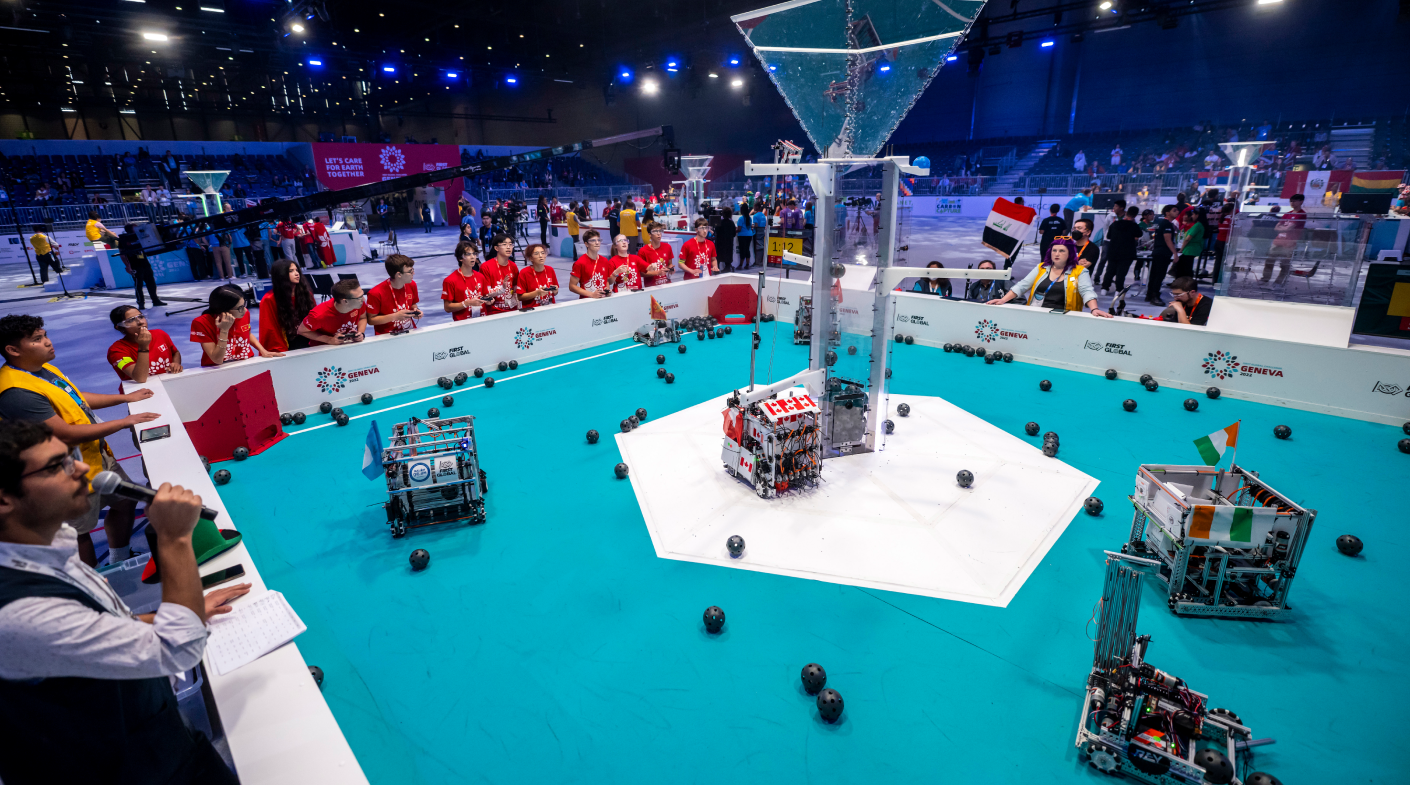
Kabloom: Exceeding a global climate change virtual conference’s registration target by 145%
After a successful 2021 campaign for a leading global financial organisation, we were asked to continue work for their 2022 conference on climate change. In 2021, the organisation was affected by the global COVID-19 pandemic and needed help driving registrations, so we used our extensive research, data insights and GDPR-compliant databases to help them create the first-ever virtual edition of the event.
We provided a digital advertising campaign, ad design, and website/landing page content consultation and guidance. This enabled us to attract more attendees than ever before, meaning that this year we exceeded our registration targets by 145%.
55+%
Total contribution to 2022 registrations
9.8M+
Digital ads seen for 2022 campaign
42,939
Potential leads to the 2022 event websites from ads
145%
Exceeded 2022 registration goal by 145%
Read more about our company's Sustainable Development Goals and our commitment to diversity, equity and inclusion, and to learning and development. You can also download the full 2022 Sustainability Report here.


